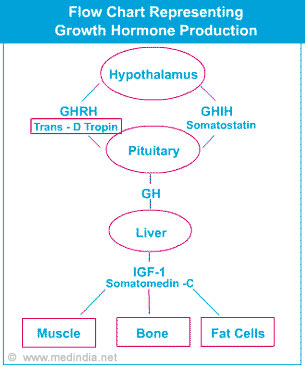Endocrine Glands Involved in Acromegaly
Pituitary gland is an endocrinal master gland of the body that releases Growth hormone that is responsible for the overall growth of a child.
The pituitary gland is a small gland at the base of the brain that produces several important hormones to control body functions such as growth, development, reproduction, and metabolism. Growth Hormone (GH) is part of a cascade of hormones that is produced by the pituitary gland. It regulates the physical growth of the body. This cascade begins in the region of the brain called the hypothalamus, which regulates the pituitary.

Growth hormone-releasing hormone (GHRH) is a hormone produced by the hypothalamus and its function is to stimulate the pituitary gland to produce GH. Somatostatin secreted by the cells of hypothalamus and also by the cells of stomach, intestine, and pancreas helps inhibit GH production. When pituitary secretes GH into the bloodstream it results in the production of another hormone called Insulin-Like Growth Factor 1 (IGF-1) in the liver. IGF-1 is the factor that actually causes the growth of bones and other tissues of the body. It also plays an important role in signaling the pituitary to reduce GH production.








